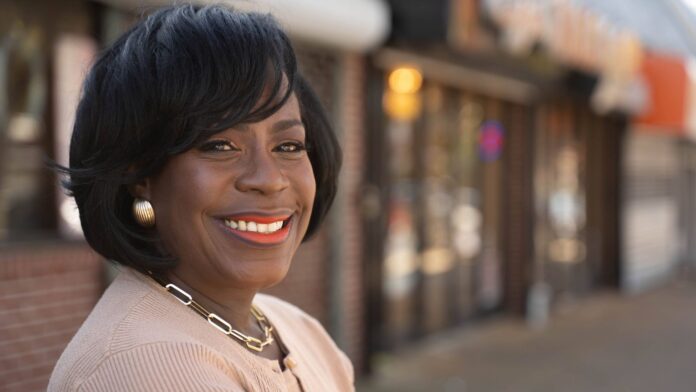The much-rumored death of the Northwest Coalition and the Democratic establishment in Philadelphia proved wildly over-stated Tuesday as their endorsed mayoral candidate won a resounding victory in a crowded field. Cherelle Parker makes history as the first woman to win a Philadelphia mayoral primary and, given the city’s nearly 9-1 Democrat to Republican ratio, will make history again as Philadelphia’s 100th mayor.
While former City Council member David Oh won the Republican primary, running unopposed, that Democratic voter base in Philadelphia makes Parker the titular incumbent mayor. Philadelphia hasn’t elected a Republican mayor since 1941.
In one of her campaign ads, Parker had noted to a group of little girls while looking at portraits of Philadelphia mayors that none of the previous mayors looked like her, a woman. Now little girls throughout the city will see a woman — a Black woman in majority Black Philadelphia — running city government.
Parker is a longtime ally of the LGBTQ and immigrant communities, as well as a union supporter; all are key demographics and voting blocs essential to winning seats in Philadelphia. The 2023 mayoral primary was a hard-fought race that highlighted the growing breach between younger progressives and the long-entrenched Democratic establishment. But with 33% of the vote in a vast field of an initial dozen candidates, Parker beat back progressive challengers Helen Gym, who like Parker resigned from City Council to run for mayor, and Rebecca Rhynhart, who herself had made history as the city’s first female Controller.
It was a race that had initially looked like it might be a win for big business for the first months of 2023, as Shop Rite mogul Jeff Brown and real estate tycoon and former City Council member Allan Domb poured their personal fortunes into a blitz of ads. The race was the most expensive in Philadelphia history, with candidates spending well over $30 million.
But as debates and forums were held citywide, the unwieldy field narrowed and some candidates, notably former Councilmembers Derek Green and Maria Quiñones-Sánchez, dropped out. Quiñones-Sánchez cited the daunting costs of staying in the race.
Parker has a storied career in politics in Philadelphia and the state, starting her career as a high school intern to party matriarch and City Council power broker Marion Tasco. In 1990, Parker won a high school speaking contest that Council member Augusta Clark had created. The prize included cash, a trip to Africa, and the opportunity to give her speech in front of City Council. That speech endeared Parker to Tasco, who brought her on as an intern.
After earning a bachelor’s degree at Lincoln University and a master’s degree from the University of Pennsylvania, Parker was hired by Tasco in 1995, working for the Councilwoman for a decade before running for the Pennsylvania House of Representatives, where she represented the 200th district from 2005 until 2015.
When Tasco stepped down in 2015, Parker was tapped by the Northwest Coalition as the natural successor to take Tasco’s place in the 9th District City Council seat. In January 2020, Parker became Majority Leader for Democrats in Council where she served until resigning last fall to run for mayor.
While the final numbers make Parker’s win seem like a foregone conclusion, the race looked like a three-way between Parker, Gym and Rhynhart as polling began to emerge in the past few weeks. The weekend before the primary, a high-profile rally for Gym featuring Sen. Bernie Sanders and Rep. Alexandria Ocasio-Cortez garnered a crowd of thousands, and a late surge for Gym pushed her ahead in polling to the first place spot that had been held by Rhynhart, who had won the Inquirer’s coveted endorsement.
In the final month of the election, GOP megadonor Jeffrey Yass contributed $1.1 million to a little-known PAC that ran ads attacking Gym. Similar attack ads ran against Rhynhart in the final days of the race.
Early returns had Rhynhart leading, followed by Parker, a surprising third place by Domb, and Gym in fourth. As more votes came in, Gym and Domb shifted places as did Rhynhart and Parker. Then Parker continued to pull ahead, leaving Rhynhart and Gym in second and third place.
While progressive votes were split between Gym and Rhynhart, Parker carried the all-important centrist voting bloc. A view of the voting results map shows Parker solid throughout West and Southwest Philadelphia and splitting Mount Airy, Germantown, Roxborough, Manayunk and other points in the Northwest with Gym and Rhynhart, who both also did well in Center City, Old City, Northern Liberties and Fishtown, where voters trend younger. Domb had a virtual lock on the Northeast, which trends white, while the three women carried the most diverse areas of the city, as well as the predominantly Black and Latinx neighborhoods.
One of the most pivotal aspects of the final tally is that all three women were ascendant. Despite the ongoing split between progressives and centrists, what was unshakeable was the voting for a female candidate. At press time the tally was Parker 69,499/33.0%, Rhynhart 47,737/22.6% and Gym 44,946/21.3%. The three women garnered 76.9% of the vote in a field of nine candidates. Voters wanted a woman mayor.
Due to a sudden dental emergency, Parker was unable to deliver her acceptance speech nor attend the celebration of her victory, but she tweeted, “I’m so incredibly honored to have earned the Democratic nomination tonight. It’s been a long road, and to see the tireless work of my campaign team, supporters, and family pay off is humbling. I’m looking forward to November and bringing our city together as its 100th mayor.” And she’ll have another opportunity come November.
While pundits will focus on the schism between progressives and centrists and the failure of progressives to get either of their candidates over the finish line (unlike recent wins in Los Angeles, Chicago and Boston) the main news remains that Philadelphia broke that gender ceiling and will have a woman mayor for the first time.
Philadelphia, along with New York City, is one of only two of the top dozen largest cities in the U.S. to never have a woman mayor. All 99 mayors in Philadelphia’s history have been men and 96 of them white men in a city that is nearly three-quarters people of color and over half women.
In her concession speech, Helen Gym noted the historic moment, saying, “Philadelphia just elected the first Black woman to serve in the highest office in this city.”
Prior to the vote, State Rep. Malcolm Kenyatta told Politico, “Philadelphia is facing real headwinds right now. Whoever wins will have to find a way to unify, lead and ultimately inspire a city desperately in need of vision and inspiration.”
After the vote Kenyatta, always a bridge builder between factions, tweeted “This is what democracy looks like,” sending solace to those whose candidates lost and saying “Let’s win in November and deliver for working families.”

